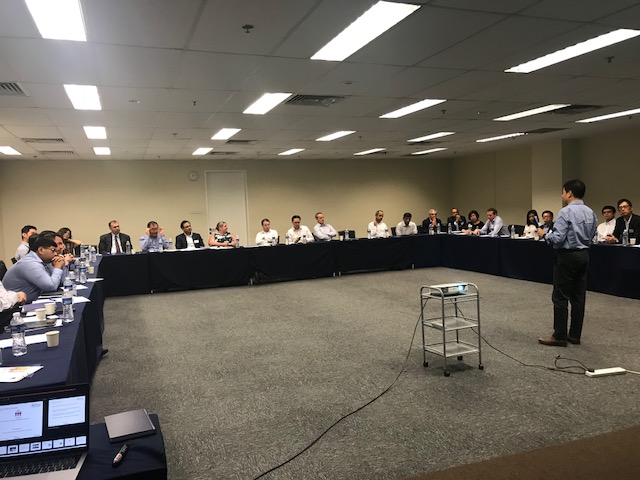 36 senior FP&A leaders in Singapore attended the FP&A Board meeting on July 17, 2018, to share and discuss the latest FP&A trends, this time focusing on zero-based budgeting (ZBB).
36 senior FP&A leaders in Singapore attended the FP&A Board meeting on July 17, 2018, to share and discuss the latest FP&A trends, this time focusing on zero-based budgeting (ZBB).
Zero-based budgeting originated in the 70s and with renewed interest especially after some highly successful implementation such as 3G Capital’s merger with Kraft, we wanted to survey how different companies use ZBB and understand the opportunities and challenges surrounding this budgeting methodology.
The group started by highlighting the pros and cons they see in ZBB. Some of the pros identified by the group are improved accountability of cost ownership, a deeper understanding of cost drivers, and a stronger focus on forward-looking management of cost.
However, there are also some perceived downside to the method, including the amount of time required, or the pressure that comes with the process being demotivating and intimidating to the field, plus perceived failure of the exercise if there are misalignment of results between a bottoms-up ZBB method and the top down target issued by management.
Two cases were then shared with the group, one by Bhavesh Shah, Senior Vice President Finance at Johnson & Johnson and the other by Rajesh Shroff, Chief Financial Officer at Adani Group. Although the two companies both use ZBB, the two have a different focus in the implementation of ZBB but both being able to achieve the results they were looking for.
At J&J, ZBB is used alongside with other budgeting methodology, and there is a clear roadmap on what expenses will utilize ZBB and these expenses are categorized in a very systematic manner to allow the organization to develop systems and processes to facilitate the ZBB rollout. Also, J&J views ZBB as a strategic tool to engage different business units to make investment decisions with the savings from expenses managed under ZBB. This allows managers to see ZBB not as a cost-cutting initiative, but instead a tool that allows them to make better investment decisions.
As ZBB is viewed as a business tool, owned by managers across the organization and not a finance exercise, managers now view their expenses with stronger ownership by actively planning under the ZBB methodology. More discussions around how to spend the savings can take place with a strategic perspective. The result is a much more engaging budget process and a strong sense of ownership for expenses at different levels of the organization.

Adani Group took a different approach and uses ZBB as a cost management initiative as it is in the commodities business and requires a quick and effective way to manage cost since commodities price are dynamic and the organization needs to adapt to external factors very quickly. All expenses are being looked at closely and drivers are identified and managed using the ZBB methodology. As a result, the company was able to react quickly to top-line challenges and improve profitability by managing costs down very quickly due to the transparency of key expense drivers ZBB brings to the organization.
As the group examines ZBB more closely, there are some practical recommendations on how to implement ZBB across different organizations:
- Define objective: as described in the two examples above, ZBB can be implemented with a very different focus in different organizations. For companies in FMCG or retail industries, where revenue streams are usually more stable, ZBB can be used as a strategic tool to identify savings and enables discussions on how to redeploy savings to high growth areas of the business. However, for companies where the business can be impacted by external factors (commodities, oil and gas) or have less predictable revenue flow (large industrial orders, infrastructure/construction), ZBB can enable companies to react quickly because of improved understanding and transparency of cost elements. Being able to understand how ZBB can be used in your organization and establish clear goals and objectives from the implementation can show the organization the benefits of going through the ZBB process.
- Be prepared: ZBB is a process that requires engagement from all levels of the organization. To realize the benefit of ZBB, companies need to be prepared to address the challenges that come with a process that will impact every level of the organization. First of all, top management needs to be visible in support of the initiative to set the tone for everyone involved. Next is clear communication that ZBB is a business-driven initiative, rather than a finance exercise. This is important as it changes the mindset and prepares managers to take ownership of the exercise. Companies will also need to prepare the actual implementation by investing in the right tools and defining the processes clearly so that quick aggregation of data, both quantitative and qualitative can be achieved.
- Finance engagement: Finally, finance teams will have to be engaged as a key support function of the process. Even though ZBB has to be business-led and business owned, for it to be successful, the finance team has to proactively manage the process. This means that the FP&A team will have to understand the base data, make sure there is high data integrity, especially when expenses may have to be re-categorized from an accounting perspective to a business perspective. Then there is the important task of helping managers understand the business drivers for expenses targeted under ZBB. For example, how does a finance team translate travel expenses from traditional accounting categorization of airfare, hotel stays and meals expenses to the business categorization of events attended and the number of participants attending? The final and probably most important step is to help facilitate the discussion and include any qualitative information so that non-financial information can also be considered.
Even though the zero-based budgeting methodology is a very simple and intuitive way of managing expenses, as we look into how different companies and FP&A professional utilizes this methodology, there are many variants and each may allow companies to achieve different results. Therefore, FP&A professionals need to plan carefully and engage the wider organization before and after the rollout of ZBB so that this powerful methodology can add value to the planning process.
The 4th Singapore FP&A Board was sponsored by Michael Page, CCH® Tagetik and Association for Financial Professionals.




